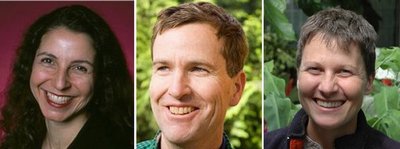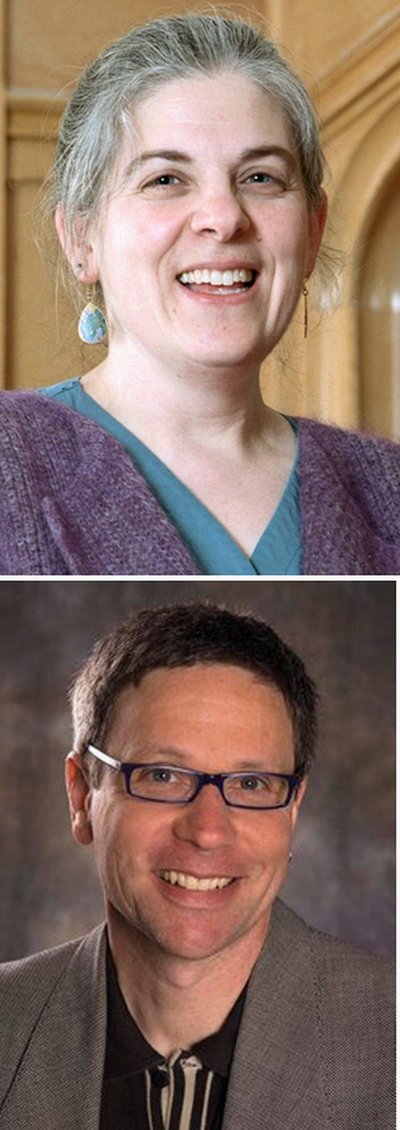April 29, 2010
Distinguished Teaching Awards Showcase, May 7
The Distinguished Teaching Awards Showcase gives everyone the chance to experience first-hand the UW’s best educators. Starting at 6:30 p.m. on May 7, three mini-classes will be taught by past and present Distinguished Teaching Award recipients, which is the University’s highest honor for teaching.
Scott Freeman, a biology lecturer and a 2010 Distinguished Teaching Award winner, will be discussing how he teaches by presenting data that he collected while teaching. His session, “Mad Scientist Experiments in Classroom—Works Students like Dawgs!” sets out to show that it is possible to get 700 students in one room engaged in active learning activities and to get them to perform better in introductory biology classes.
“Specifically, [I will show] how exam and final grade performance changed as I changed my approach to teaching,” he said.
Freeman is very excited to present and is looking forward to a “lively audience” to exchange ideas with. He is also incredibly “thrilled, speechless, numb, excited and honored…” about receiving the Distinguished Teaching Award.
A 2010 Excellence in Teaching Award (given to outstanding graduate teaching assistants) recipient, Beth Wheat, will teach “Ecology & Conservation: Your backyard and the possibilities of urban agriculture.”
“We’ll be talking about some basic ecological concepts,” Wheat said, “and then trying to think about how they apply or don’t apply to the production of food in your backyard! We’ll talk about biodiversity, resilience, population dynamic and then talk about how these concepts can be seen and studied in the backyard.”
Wheat is a founder of the UW Student Farm, which sits next to the Botany Greenhouse on 1/3 of an acre and grows 70 different crops. She also teaches Biology 240: Urban Farm. “It’s a way for students to be part of the process of urban farming–from picking the crops, planting, harvesting, all of it. They see where and learn how food is grown.”
When asked about receiving the honor, “I think it is humbling to be teaching at the UW. Our academic community is really dynamic. … I have learned so much from teaching, mentoring and working alongside undergraduates in courses and at the student farm. Because of how much the students have taught me, it is an absolute honor to be selected for the award.”
The third mini-class is “Ballet’s romantic heroes or a couple of unscrupulous cads: James and Albrecht get their comeuppance.”
“Every other year I teach Early Dance History that covers the Renaissance to the 20th century dance and focuses on ballet history,” said Betsy Cooper, associate professor and director of the Dance Program. “So, I decided to give a mini-presentation highlighting some of the themes, production elements and aesthetic qualities found in romantic ballets.
“Specifically,” she continued, “I will be discussing the theme of courtship/marriage, some of the mid-19th century issues and anxieties surrounding the issue of marriage and how these relate to class structure, power, and female agency. I will show some very brief clips from the famous romantic ballets La Sylphide and Giselle.
Cooper is a 2004 recipient of the Distinguished Teaching Award.
“I love teaching and sharing my knowledge of and love for ballet,” she said. “It will be fun to share this information with a new and very diverse audience. … One of the reasons I enjoy talking about ballets is that many people view them somewhat passively. Perhaps they delight in the display of technical brilliance, and enjoy the grace and elegance of the performers … the music, costumes and scenery …
“But these ballets are classics for a reason. They deal with universal issues that resonate as strongly with audiences today as 150 years ago. … In addition, these ballets give us insight into what audiences were interested in viewing close to two centuries ago. In many cases they present a microscopic view of the society that produced them. Why do so many of these ballets deal with courtship and marriage? Why were audiences of the period so swept up in the topic?”
Following the mini-classes, the instructors participate in a panel discussion about teaching today joined by:
Moderator:
Matt McGarrity
Lecturer, Communication, School of Communication
Matt McGarrity is a lecturer in the Communication Department. In addition to teaching classes in public speaking, argumentation, communication pedagogy, and classical rhetoric, he directs the University of Washington Speaking Center, which offers speech coaching to students.
Panelists:
David Goldstein
Lecturer, Interdisciplinary Arts & Sciences – UW Bothell
Interim Director, Teaching and Learning Center – UW Bothell
David Goldstein teaches American and ethnic studies in the Program in Interdisciplinary Arts and Sciences at UW Bothell, and serves as director of its Teaching and Learning Center. He is a 2007 Distinguished Teaching Award recipient.
Erika Goldstein
Professor, Medicine, Division of General Internal Medicine
Following medical school at the University of Rochester, Dr. Erika Goldstein completed a residency in primary-care internal medicine at the University of Washington School of Medicine. Since 1989, she has chaired the Introduction to Clinical Medicine course (ICM) for first year students, adding the yearlong ICM II course in 1996. She is a 2002 Distinguished Teaching Award recipient.
The mini-classes and panel discussion are in Mary Gates Hall. The program, which is free and open to the public, begins at 6:30 p.m. on May 7.


